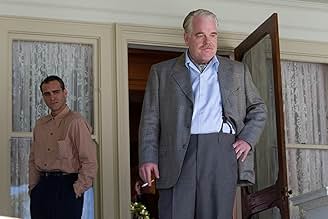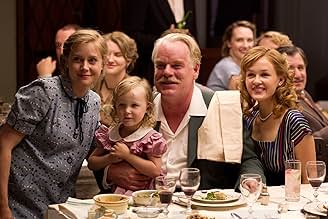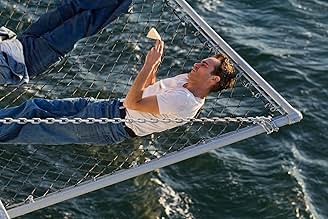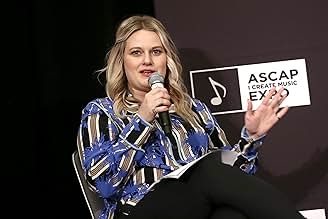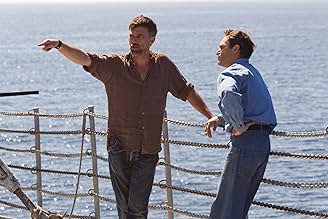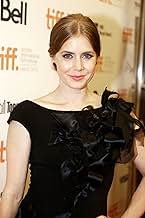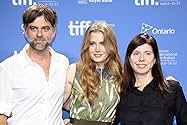Ein Marineveteran kehrt verstört und ohne Zukunftsperspektive aus dem Krieg zurück - bis er in die Fänge der Glaubensgemeinschaft "The Cause" und deren charismatischen Anführers gerät.Ein Marineveteran kehrt verstört und ohne Zukunftsperspektive aus dem Krieg zurück - bis er in die Fänge der Glaubensgemeinschaft "The Cause" und deren charismatischen Anführers gerät.Ein Marineveteran kehrt verstört und ohne Zukunftsperspektive aus dem Krieg zurück - bis er in die Fänge der Glaubensgemeinschaft "The Cause" und deren charismatischen Anführers gerät.
- Regie
- Drehbuch
- Hauptbesetzung
- Für 3 Oscars nominiert
- 75 Gewinne & 187 Nominierungen insgesamt
Patrick Wilder
- V.A. Patient
- (as Patrick Biggs)
Empfohlene Bewertungen
Paul Thomas Anderson's "The Master" is a puzzling, often bewildering film. Very few films have left me shaken and stirred and still leave me wondering, "What was that all about?" I can't say that I hated the ride. It is, quite simply, a remarkable film from one of America's best filmmakers today. This film is not for everyone, however.
The film's center plot; the one about self-described nuclear physicist, philosopher and professor Lancaster Dodd and his "organization" "The Cause" - as seen from the point of view from a shell-shocked psychotic drunk Freddie Quell. During the course of the film Lancaster and Freddie bond somewhat with Lancaster progressing his latest works.
The main performances by Joaquin Phoenix and Philip Seymour Hoffman are superb, and should warrant both of them Academy Award Nominations for Best Actor. Both of them. Phoenix is literally on fire here, his quirky mannerisms, twitching lips, unforgiving, unsettling eyes and ferocious anger and voice had me on the edge every time I see him on screen. Hoffman also is more subtle, though we see growing anger and rage whenever he feels that his work is being threatened. He can be classy, charismatic, and when threatened, loses all of that and becomes about as desperate as Freddie. Brilliant work by both actors. Watch the scene where Lancaster gets through to Freddie, or the harrowing scene where both of them are in jail cells. Special mention to Amy Adams who, while not really standing out, gives off a peculiar and somewhat sinister aura whenever she's on the screen.
Anderson's solid screenplay and his concentrated direction bring the goods. There seems to be a pattern about Anderson's last three films including this one. Both "Punch-Drunk Love" and "There Will Be Blood" featured lead characters who are extremely lonely and prone to snap to anger. "The Master" is somewhat a bit of both, where the lonely man can be both psychotic without reason and yet there are scenes which show he is, after all, a man. Some very well written lines ("If you can find peace without looking up to a master, any master...") meshed with some really great cinematography by Mihai Malaimare Jr. that brings nice color tones to the 1950 production design. Complementing all of this is Jonny Greenwood's eerie, dissonant score which makes the movie all the more odd, unsettling, and yet compelling to watch.
Eventually, both men in the movie are the masters of their own fate, and Anderson his own. It may move some and it may turn away others, but this is a fascinating watch nonetheless. "The Master" is one of 2012's very best films.
Overall: 91%
The film's center plot; the one about self-described nuclear physicist, philosopher and professor Lancaster Dodd and his "organization" "The Cause" - as seen from the point of view from a shell-shocked psychotic drunk Freddie Quell. During the course of the film Lancaster and Freddie bond somewhat with Lancaster progressing his latest works.
The main performances by Joaquin Phoenix and Philip Seymour Hoffman are superb, and should warrant both of them Academy Award Nominations for Best Actor. Both of them. Phoenix is literally on fire here, his quirky mannerisms, twitching lips, unforgiving, unsettling eyes and ferocious anger and voice had me on the edge every time I see him on screen. Hoffman also is more subtle, though we see growing anger and rage whenever he feels that his work is being threatened. He can be classy, charismatic, and when threatened, loses all of that and becomes about as desperate as Freddie. Brilliant work by both actors. Watch the scene where Lancaster gets through to Freddie, or the harrowing scene where both of them are in jail cells. Special mention to Amy Adams who, while not really standing out, gives off a peculiar and somewhat sinister aura whenever she's on the screen.
Anderson's solid screenplay and his concentrated direction bring the goods. There seems to be a pattern about Anderson's last three films including this one. Both "Punch-Drunk Love" and "There Will Be Blood" featured lead characters who are extremely lonely and prone to snap to anger. "The Master" is somewhat a bit of both, where the lonely man can be both psychotic without reason and yet there are scenes which show he is, after all, a man. Some very well written lines ("If you can find peace without looking up to a master, any master...") meshed with some really great cinematography by Mihai Malaimare Jr. that brings nice color tones to the 1950 production design. Complementing all of this is Jonny Greenwood's eerie, dissonant score which makes the movie all the more odd, unsettling, and yet compelling to watch.
Eventually, both men in the movie are the masters of their own fate, and Anderson his own. It may move some and it may turn away others, but this is a fascinating watch nonetheless. "The Master" is one of 2012's very best films.
Overall: 91%
My Rating : 8/10
Inspired by Scientology founder L. Ron Hubbard and the development of a cult, 'The Master' is a drama-piece through and through.
The movie doesn't have a message or goal as such and sort of does it's own thing.
The things worth watching are the terrific performances, weird content and some very fine cinematography.
Inspired by Scientology founder L. Ron Hubbard and the development of a cult, 'The Master' is a drama-piece through and through.
The movie doesn't have a message or goal as such and sort of does it's own thing.
The things worth watching are the terrific performances, weird content and some very fine cinematography.
Paul Thomas Anderson has grown as perhaps the greatest American auteur of his generation. At 42, this is his 6th film (following 1996's "Hard Eight", 1997's "Boogie Nights", 1999's "Magnolia" - my all-time favorite -, 2002's "Punch-Drunk Love", and 2007's "There Will Be Blood"). Like the late master Kubrick and the aging master Terrence Malick (who, coincidentally, just debuted his 6th film, "To the Wonder", at the latest Venice Film Festival where PTA won the Silver Lion for Best Director), he isn't the most prolific of filmmakers; but his perfectionist creations, cerebral yet strikingly cinematic and emotional, always leave an indelible mark (polarizing audiences but usually earning critical acclaim). "The Master" is no exception. Shot on 70mm film, it is not so much of an "outside" epic as you'd imagine - although every single image is stunning and perfectly composed (courtesy of cinematographer Mihai Malaimare Jr., who replaced Robert Elswit, Anderson's usual collaborator). It closely resembles "There Will Be Blood" in tone and content, but it stands on its own (Jonny Greenwood is once again responsible for the score).
Freddie Quell (Joaquin Phoenix) is a troubled and troubling drifter who becomes the right-hand man of Lancaster Dodd (actor extraordinaire Philip Seymour Hoffman), "the master" of a cult named The Cause in post-WWII America. Their strange, ambiguous relationship is the center of the film. "The Master" is a thought-provoking indictment of cult fanaticism and lies sold as religion, which has caused controversy and concern among Scientologists even before its release. By not mentioning real names, Anderson is capable of broadening the scope of his story and making it richer - and subtler - than a straightforward "Scientology flick" would have been. Like his previous films, there's more than meets the eye at a single viewing, and his attention to detail pays off (there's also a visual homage to Jonathan Demme's "Melvin and Howard", another favorite of Anderson's, in a motorcycle racing scene). Hoffman is as good as ever, and Amy Adams is highly effective (slowly depriving herself of cutesy mannerisms) as his wife. David Lynch's golden girl Laura Dern has a small role as well. But this is Joaquin Phoenix's hour, all the way. River Phoenix's younger brother has become a fascinating actor himself since Gus Van Sant's dark comedy "To Die For" (1995), and, after his much publicized "retirement from acting" and music career hoax in 2009, he managed to come back with a performance for the ages, which shall culminate in Oscar gold. As for Anderson, it is unsure whether the Academy will finally recognize him as he deserves. His films may still be too outlandish for the Academy's taste (he's announced his next project will be an adaptation of Thomas Pynchon's crime novel "Inherent Vice", a seemingly less ambitious project he hopes to make in less than five years). Regardless of Oscar numbers, we can rest assured that in a world where PTA gets to make such personal and original work and find his audience, there is still hope, and room, for intelligent filmmaking.
Freddie Quell (Joaquin Phoenix) is a troubled and troubling drifter who becomes the right-hand man of Lancaster Dodd (actor extraordinaire Philip Seymour Hoffman), "the master" of a cult named The Cause in post-WWII America. Their strange, ambiguous relationship is the center of the film. "The Master" is a thought-provoking indictment of cult fanaticism and lies sold as religion, which has caused controversy and concern among Scientologists even before its release. By not mentioning real names, Anderson is capable of broadening the scope of his story and making it richer - and subtler - than a straightforward "Scientology flick" would have been. Like his previous films, there's more than meets the eye at a single viewing, and his attention to detail pays off (there's also a visual homage to Jonathan Demme's "Melvin and Howard", another favorite of Anderson's, in a motorcycle racing scene). Hoffman is as good as ever, and Amy Adams is highly effective (slowly depriving herself of cutesy mannerisms) as his wife. David Lynch's golden girl Laura Dern has a small role as well. But this is Joaquin Phoenix's hour, all the way. River Phoenix's younger brother has become a fascinating actor himself since Gus Van Sant's dark comedy "To Die For" (1995), and, after his much publicized "retirement from acting" and music career hoax in 2009, he managed to come back with a performance for the ages, which shall culminate in Oscar gold. As for Anderson, it is unsure whether the Academy will finally recognize him as he deserves. His films may still be too outlandish for the Academy's taste (he's announced his next project will be an adaptation of Thomas Pynchon's crime novel "Inherent Vice", a seemingly less ambitious project he hopes to make in less than five years). Regardless of Oscar numbers, we can rest assured that in a world where PTA gets to make such personal and original work and find his audience, there is still hope, and room, for intelligent filmmaking.
Yes, herein contains some of the most ravishing filmmaking of the new millennium. The period details are abstract yet precise. The score has a stark, primordial allure. It's post-WWII America: Psychologically scarred veterans attempt to cramp themselves back into society. One is loner Freddie Quell, adrift in emotional confusion. He's secured a gig as a portrait photographer at a lavish department store imagined like a temple of indulgent commercialism. But Freddie doesn't last long there. In the darkroom, he screws models and chugs rotgut he makes with photo chemicals. Ultimately, he loses it on a customer, not just hitting him but harassing and lambasting him, working out some indecipherable, irrepressible rage.
Phoenix's performance as Freddie reduces all he's done before to a preparation exercise. He longs for something, but even he can't tell you what, and that sorrow has clotted into self- destructive ritual. We see his snarly face from angles we haven't seen before. We're not sure if his leery eyes are hateful or if he's dead inside. He's a captivating animal.
Then he meets stout, articulate Lancaster Dodd, always circled by people who treat him like a prodigy, hanging on his every word, laughing at all his mugging. Lancaster fancies himself a renaissance man. He's married to Peggy, who's much more vigilant than we first think. His son trails the proceedings with a dormant pose of derision. His daughter marries a man who, like everyone else in their clique, views him as a wizard.
The film belongs to Phoenix, but Hoffman more than does his thing, his affectations ringing with conceit and fraudulence. Freddie---father dead, mother institutionalized---is naturally drawn to Dodd, who promises answers, mental freedom, happiness, even claims to cure leukemia. He's written a book his bootlickers treat as a sort of bible. He loves to charm and perform.
It's well-known that Lancaster's cult is inspired by L. Ron Hubbard's Scientology. It's not direct, but the manner in which Lancaster draws Freddie into the fold, among other things, is unmistakably influenced by the contentious institution and Hubbard's life. Paul Thomas Anderson doesn't bind to that inspiration for his movie...but he doesn't bind to anything, really. You walk out muddled, wearied, wondering where to start in connecting the dots in this elegant, arresting movie. The story is as confounding as its technique is magnificent.
Anderson, the true wunderkind of the Tarantino generation, sets everything up so beautifully, you wait for the turning point to prevail so the intrigue can come to boil. Instead, nothing progresses. The dramatic developments seem to dwindle and become less consistent as the movie drifts along, and Anderson throws in pauses, like a lingering desert scene or an outstretched montage in which Freddie is made to pace in a room, that slow the movie to a drudge. Freddie's sex preoccupation, which was stressed in the film's early stretch, grows dissonant. It's less about narrative arc and more the emotional condition of two men, a twist of trust and mistrust, id and superego. PTA's vision is grand in scope, but his result is not so much ambiguous as opaque and detached.
For the first time in his immaculate career, the greatest filmmaker of his generation seems to languish. His newfound frigidness makes the film easy to admire but difficult to love. Anderson is so stunningly impressive, in fact, that it's taken me two viewings of The Master to admit all this to myself. Understandably, some critics have patronized it as deliberately evasive and occult, but isn't that just double-talk? A glorification of an artist's failure to proportionately bear his ideas? Something particularly intriguing is how the movie poses questions not so much about the importance of faith, but how far the human limit for change can extend and to confront emotional devastation so heavy it can never recover. But the film is too ambivalent or cautious to probe them in depth. By the end, it's become an opaque challenge between two phenomenal actors whose commitment to their roles is awe-inspiring, but it's manacled to a work so in awe of itself, the audience gets blockaded.
Phoenix's performance as Freddie reduces all he's done before to a preparation exercise. He longs for something, but even he can't tell you what, and that sorrow has clotted into self- destructive ritual. We see his snarly face from angles we haven't seen before. We're not sure if his leery eyes are hateful or if he's dead inside. He's a captivating animal.
Then he meets stout, articulate Lancaster Dodd, always circled by people who treat him like a prodigy, hanging on his every word, laughing at all his mugging. Lancaster fancies himself a renaissance man. He's married to Peggy, who's much more vigilant than we first think. His son trails the proceedings with a dormant pose of derision. His daughter marries a man who, like everyone else in their clique, views him as a wizard.
The film belongs to Phoenix, but Hoffman more than does his thing, his affectations ringing with conceit and fraudulence. Freddie---father dead, mother institutionalized---is naturally drawn to Dodd, who promises answers, mental freedom, happiness, even claims to cure leukemia. He's written a book his bootlickers treat as a sort of bible. He loves to charm and perform.
It's well-known that Lancaster's cult is inspired by L. Ron Hubbard's Scientology. It's not direct, but the manner in which Lancaster draws Freddie into the fold, among other things, is unmistakably influenced by the contentious institution and Hubbard's life. Paul Thomas Anderson doesn't bind to that inspiration for his movie...but he doesn't bind to anything, really. You walk out muddled, wearied, wondering where to start in connecting the dots in this elegant, arresting movie. The story is as confounding as its technique is magnificent.
Anderson, the true wunderkind of the Tarantino generation, sets everything up so beautifully, you wait for the turning point to prevail so the intrigue can come to boil. Instead, nothing progresses. The dramatic developments seem to dwindle and become less consistent as the movie drifts along, and Anderson throws in pauses, like a lingering desert scene or an outstretched montage in which Freddie is made to pace in a room, that slow the movie to a drudge. Freddie's sex preoccupation, which was stressed in the film's early stretch, grows dissonant. It's less about narrative arc and more the emotional condition of two men, a twist of trust and mistrust, id and superego. PTA's vision is grand in scope, but his result is not so much ambiguous as opaque and detached.
For the first time in his immaculate career, the greatest filmmaker of his generation seems to languish. His newfound frigidness makes the film easy to admire but difficult to love. Anderson is so stunningly impressive, in fact, that it's taken me two viewings of The Master to admit all this to myself. Understandably, some critics have patronized it as deliberately evasive and occult, but isn't that just double-talk? A glorification of an artist's failure to proportionately bear his ideas? Something particularly intriguing is how the movie poses questions not so much about the importance of faith, but how far the human limit for change can extend and to confront emotional devastation so heavy it can never recover. But the film is too ambivalent or cautious to probe them in depth. By the end, it's become an opaque challenge between two phenomenal actors whose commitment to their roles is awe-inspiring, but it's manacled to a work so in awe of itself, the audience gets blockaded.
I had no clue what I was heading into when I pressed play. I think it's really hard to make a bad movie when you have Philip Seymour Hoffman, Jaoquin Phoenix, Amy Adams, and Jesse Plemons leading the charge. Hoffman and Phoenix are fully absorbed into their characters and the film forces its audience to try and follow these conversations that somehow feel super grounded (due to Hoffman's amazing delivery) and unsettling at the same time. This movie really could not have worked without the talent of these actors.
Amy Adams does so much with so little screen time; I do wish we got more time with her but I think her lack of presence contributes to the messaging of the film. She gives an extremely pulled back/subtle performance of a woman that is truly in the middle of the storm.
This feels fresh and distinct from any other movie I've watched, so I'd definitely recommend it.
Amy Adams does so much with so little screen time; I do wish we got more time with her but I think her lack of presence contributes to the messaging of the film. She gives an extremely pulled back/subtle performance of a woman that is truly in the middle of the storm.
This feels fresh and distinct from any other movie I've watched, so I'd definitely recommend it.
Wusstest du schon
- WissenswertesDuring the jail cell scene, Joaquin Phoenix breaks a real toilet. His actions were entirely improvised. Due to the historical past of the building where the scene took place, the toilet was considered "historical." Joaquin had no intentions to break the toilet, nor did he think it was possible.
- PatzerIn the "pacing" scene, as Quell goes from wooden paneled wall to window and back, the second time he goes to he wooden paneling, he breaks out a panel when he pounds it with rage. In the numerous successive shots, the wood panel is restored.
- Zitate
Lancaster Dodd: If you figure a way to live without serving a master, any master, then let the rest of us know, will you? For you'd be the first person in the history of the world.
- Crazy CreditsAfter its title, this film has no further opening credits.
- VerbindungenEdited into Verschwörungstheorien: The Hollywood Syndicate (2015)
- SoundtracksBaton Sparks
From '48 Reponses to Polymorphia'
Written by Jonny Greenwood
Performed by The Aukso Chamber Orchestra
Courtesy of Unreliable Ltd.
Top-Auswahl
Melde dich zum Bewerten an und greife auf die Watchlist für personalisierte Empfehlungen zu.
Details
- Erscheinungsdatum
- Herkunftsland
- Sprachen
- Auch bekannt als
- The Master: Todo Hombre Necesita Un Guía
- Drehorte
- Mare Island, Vallejo, Kalifornien, USA(as Philadelphia, Pennsylvania and various houses, a park and the docks)
- Produktionsfirmen
- Weitere beteiligte Unternehmen bei IMDbPro anzeigen
Box Office
- Budget
- 32.000.000 $ (geschätzt)
- Bruttoertrag in den USA und Kanada
- 16.377.274 $
- Eröffnungswochenende in den USA und in Kanada
- 736.311 $
- 16. Sept. 2012
- Weltweiter Bruttoertrag
- 28.689.359 $
- Laufzeit2 Stunden 18 Minuten
- Farbe
- Sound-Mix
- Seitenverhältnis
- 1.85 : 1
Zu dieser Seite beitragen
Bearbeitung vorschlagen oder fehlenden Inhalt hinzufügen







